Principles of Economic Liberty: The Biblical Case for Free Enterprise
A Six-Session Bible Study Series Based on the Word Foundations Series of Articles Titled “The Bible and Free Enterprise”
“The Bible and Free Enterprise” is a Word Foundations series of articles that makes the case that the free enterprise economic model, or capitalism, is biblical. While free enterprise can be distorted and abused, the distortions are departures from biblical principles and a biblical worldview. Now more than ever, Christians must understand and be able to articulate that free enterprise, or capitalism, is rooted in biblical teachings and fosters qualities the Scripture commends. Not convinced? In this six-session series, you’ll encounter overwhelming evidence. The Bible is not silent about economic freedom!
Session 1 is based on part 1 in the series “The Bible and Free Enterprise.”
Session 1
SURVEYING THE ECONOMIC LANDSCAPE: A CLASH OF WORLDVIEWS
In practice, socialism didn’t work. But socialism could never have worked because it is based on false premises about human psychology and society, and gross ignorance of human economy.
—David Horowitz—
Display the following graphic and ask, What is the purpose of government?

Among the answers you receive likely will be this one: Government exists to meet the needs of its people. Encourage additional answers and facilitate a brief discussion.
Share the following:
While many believe government exists to meet the people’s needs, Scripture teaches individual responsibility. So does history. Settlers in both Jamestown and Plymouth initially sought to produce food and wealth according to a communal system. Workers contributed the fruits of their labors to a “common store” on which all relied. This approach pushed both settlements to the brink of starvation. Yet when land was assigned and people could reap the benefits of their own work, the communities prospered.
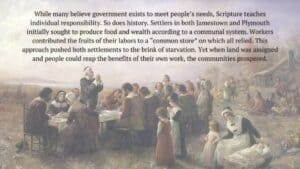
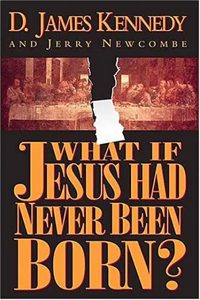 The Pilgrims lived under a communal arrangement for two years. The approach later came to be know as known as socialism. In their book What if Jesus Had Never Been Born? Dr. D. James Kennedy and Jerry Newcombe hone in on the scenario that unfolded in Plymouth. They rightly refer to it as “AN EXPERIMENT IN SOCIALISM.” They write, “Many people are not aware of the fact that in America, we have seen a perfect, almost laboratory, experiment of socialism. Ironically, America, the land of the free-enterprise system, began with socialism.”1
The Pilgrims lived under a communal arrangement for two years. The approach later came to be know as known as socialism. In their book What if Jesus Had Never Been Born? Dr. D. James Kennedy and Jerry Newcombe hone in on the scenario that unfolded in Plymouth. They rightly refer to it as “AN EXPERIMENT IN SOCIALISM.” They write, “Many people are not aware of the fact that in America, we have seen a perfect, almost laboratory, experiment of socialism. Ironically, America, the land of the free-enterprise system, began with socialism.”1
Drawing from and paraphrasing Plymouth Governor William Bradford’s own written record, we provide a detailed account of the Pilgrims’ journey into and out of socialism in a Word Foundations post from 2019. According to Bradford,
We faced obstacle after obstacle. Those who worked did so begrudgingly, and many would offer excuse after excuse not to work. Here are some examples.
-
-
-
- The young unmarried men—those who were strongest and who had the most time and the greatest ability to produce—resented that they were, in effect, being made to work for other men’s wives and children, without any additional compensation.
- Whether strong or weak, everyone working, whether he did much or little, would wind up with the same amount of food and other resources. If an individual worked a full eight hours in a day, and another worked only two, each received the same. Those carrying the greater load strongly believed this to be an extreme injustice. Can you blame them?
- Experience counted for nothing; the older men felt disrespected by those who were younger.
- Under the communal arrangement, the wives had to cook and do laundry for anyone and everyone—not just their own husbands and families. This angered husbands, who, along with their wives, felt this was a form of slavery.
-
-
All of this was bad enough, but I’m convinced it would have been a lot worse if we hated each other. No one in our congregation was perfect—not by a long shot. Still, we were a people who had common goals and who sincerely wanted everyone among us to have the best. Our company had more than its share of honest and decent men and women.
Sharing resources sounds so compassionate and compelling. It has great emotional appeal. Operating this way, however, set us at one anothers’ throats. It bred resentment, disrespect, ill will, selfishness, envy, and greed. It was a dead end that would have killed us all.
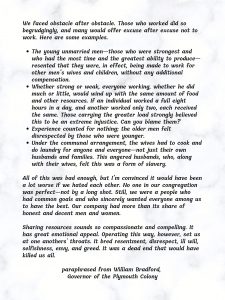
A PDF file of the above visual is available here, and a PDF of a typed copy here.
Say: It’s interesting. Today we’re being told that capitalism breeds selfishness, greed, and envy, and even that it hurts the poor. (Background information: These and other accusations leveled against capitalism can be found here and here.) This is ironic, given the horrors that occur wherever and whenever socialism is tried (more on this momentarily).
Encourage participants to put themselves in the places of the Pilgrims and to imagine they have been involved in their experiment in socialism. Ask and discuss:
-
-
- What were the possible goals of the approach the Pilgrims took? Note that the communal arrangement was part of an agreement they had made with the investors who helped fund their voyage across the Atlantic. What were the results of the approach they took? Why didn’t it work?
- Do the bulleted items in Bradford’s report make sense to you? Would you feel the same way, or differently? Explain.
- What kinds of feelings and concerns did the experiment in socialism foster in the hearts and minds of the Pilgrims? Were these feelings and perspectives justified?
- Remind participants that the report you’ve been discussing is a paraphrase. Quote William Bradford’s actual words: “The failure of this experiment of communal service, which was tried for several years, and by good and honest men proves the emptiness of the theory of Plato and other ancients, applauded by some of later times, — that the taking away of private property, and the possession of it in community, by a commonwealth, would make a state happy and flourishing; as if they were wiser than God.”
-
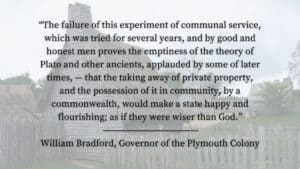
-
-
- How is the Pilgrims’ experiment in socialism instructive for us, in our day? What lessons or warnings does it offer us we need to heed? Point out that despite the hundreds of years that have passed since the Pilgrims and the residents of Jamestown experimented with socialism, human nature and the realities of the socialist approach have not changed. In other words, there is nothing about us or our world today that is different enough to produce results different from those the early settlers of America saw when they set up a communal system. Say: We’ll examine evidence for this in just a few moments.
-
Government’s Job
Say: Let’s return now to the matter of the responsibilities governments are to fulfill. What are a government’s chief duties? Divide the large group in two and assign one group Romans 13:1-7 and the other 1 Peter 2:13-17. Ask the members of each group to discuss their assigned passage and determine from it what government’s God-ordained duties are. Ask a volunteer from each group to report.
Summarize the reports by making clear that these passages teach that government’s main responsibility is to punish those who do what is wrong and commend or reward those who do what is right. Emphasize that in doing so, civil authorities maintain order in society. Say: We’ll talk more about this in our next session. (Background information: Go here for a brief, but more complete discussion of citizens’ and governments’ duties before God.)
Government’s primary responsibility is to maintain order in society by punishing those who do wrong and by commending or rewarding those who do what is right (see Romans 13:1-7 and 1 Peter 2:13-17).
Definitions
 Say: Let’s define some key terms at the outset, to make sure we all understand what we mean when we use specific words or phrases. Go here for a webpage displaying these definitions. Go here to obtain a digital graphic for each one.
Say: Let’s define some key terms at the outset, to make sure we all understand what we mean when we use specific words or phrases. Go here for a webpage displaying these definitions. Go here to obtain a digital graphic for each one.
-
- Socialism is “an economic system based upon governmental or communal ownership of the means of production and distribution of goods and services.”2
- Socialism is a component of Marxism, which is “an atheistic and materialistic worldview based on the ideas of Karl Marx that promotes the abolition of private property, public ownership of the means of production (i.e., socialism), and the utopian dream of a future communistic state.”3
- Communism is “the Marxist ideal of a classless and stateless utopian society in which all property is commonly owned and each person is paid according to his or her abilities and needs.”4 Explain that the “ideal” of a “stateless” and “classless” society is impossible to achieve. In communist countries, the state becomes god and two classes of people exist: the tyrannical dictators who live in luxury and the property-stricken population of the country. People own nothing; the state owns and runs everything. Thus, the people are slaves belonging to the state.
- Capitalism or free enterprise is “an economic system in which capital assets are privately owned, and the prices, production, and distribution of goods and services are determined by competition within a free market.”5
- Social justice, “also known as economic justice, is a term describing the redistribution of wealth supposedly for the common good of all. However, this comes at the expense of wage earners and liberty by demanding a society to conform. Those who work and have must give to those who don’t work and don’t have.” Social justice, therefore, tilts strongly in the direction of socialism, Marxism, and communism—and away from free enterprise. In a post at Word Foundations released in March of 2019, we explored five ways social justice and biblical justice are opposing ideals.
- Socialism is “an economic system based upon governmental or communal ownership of the means of production and distribution of goods and services.”2
All of the above terms and their definitions are presented in the following graphic.
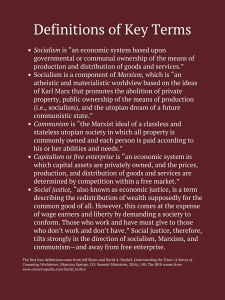
A PDF file of the above graphic is available here.
A printable PDF file (typed) of these definitions is available here.
Socialism: A Path to Poverty, Death, and Destruction
Emphasize that socialism has failed and has proved to be extremely costly everywhere it has been tried. Use some of the resources in this section drive home the point. (Do not feel you have to or need to use all of them.)
Former Arkansas Governor Mike Huckabee was interviewed by Frank Wright, president and CEO of D. James Kennedy Ministries, not long ago. They discussed the horrific effects of socialism worldwide. Here is a brief, one-minute clip from the interview.


Note that Frank Wright said, “The history of socialism is one of the destruction of hundreds of millions of their own citizens—not in wars; you’ll either cooperate or they’ll do away with you.” (Background: This article provides additional information.)
Also, share this quote from Margaret Thatcher, who served as Prime Minister of Great Britain from May 4, 1979 to November 28, 1990: “There is no such thing as ‘safe’ socialism. If it’s safe, it’s not socialism. And if it’s socialism, it’s not safe. The signposts of socialism point downhill to less freedom, less prosperity, downhill to more muddle, more failure. If we follow them to their destination, they will lead this nation into bankruptcy.”
Digital graphics showcasing these quotes are available here.
Why doesn’t socialism work? Dr. Adrian Rogers, longtime pastor of Bellevue Baptist Church in Memphis, Tennessee, explains:
Friend, you cannot legislate the poor into freedom by legislating the wealthy out of freedom. And what one person receives without working for, another person must work for without receiving. The government can’t give to anybody anything that the government does not first take from somebody. And when half of the people get the idea they don’t have to work because the other half’s going to take care of them, and when the other half get the idea it does no good to work because somebody’s going to get what I work for. That, dear friend, is about the end of any nation.
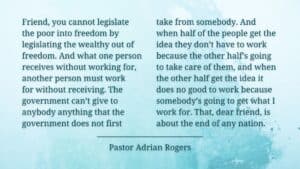
Ask participants to recall your earlier discussion of what happened when the Pilgrims tried socialism 400 years ago. Emphasize that socialism has not improved and human nature has not changed. Show this brief video, which highlights the results of a modern experiment in socialism.
Ironically, Capitalism Has Been Given a Bad Rap
 Emphasize that despite socialism’s disastrous track record, it is capitalism that has been given a bad rap. We’ll refute many of the myths people believe about capitalism in upcoming sessions. For now, focus on this truth: There’s only one place socialism works, and that is in people’s imaginations. Economist Thomas Sowell has astutely observed, “The strongest argument for socialism is that it sounds good. The strongest argument against socialism is that it doesn’t work. But those who live by words will always have a soft spot in their hearts for socialism because it sounds so good.” A PDF file of this graphic is available here.
Emphasize that despite socialism’s disastrous track record, it is capitalism that has been given a bad rap. We’ll refute many of the myths people believe about capitalism in upcoming sessions. For now, focus on this truth: There’s only one place socialism works, and that is in people’s imaginations. Economist Thomas Sowell has astutely observed, “The strongest argument for socialism is that it sounds good. The strongest argument against socialism is that it doesn’t work. But those who live by words will always have a soft spot in their hearts for socialism because it sounds so good.” A PDF file of this graphic is available here.
 Richard Nixon said, “Capitalism works better than it sounds, while socialism sounds better than it works.” A PDF file of this graphic is available here.
Richard Nixon said, “Capitalism works better than it sounds, while socialism sounds better than it works.” A PDF file of this graphic is available here.
Mark it down. However great socialism sounds, it does not work. Christians should not be taken in by the enticing rhetoric.
Emphasize that this series of studies will show a good many ways the free enterprise economic model aligns with Scripture. We’ll see numerous benefits of capitalism we’ve taken for granted. The series also will warn us about the dangers of socialism and and help us warn others. Socialism is gaining popularity in America, particularly among the young, including young believers.
A Biblical Worldview Makes the Difference
Explain: Significantly, the more thoroughly a believer is grounded in a biblical worldview, the less attractive socialism is to him or her. The reverse also is true: The less grounded someone is in a biblical worldview, the more he or she is enticed by socialism.
What is a worldview? It is “a pattern of ideas, beliefs, convictions, and habits that help us make sense of God, the world, and our relationship to God and the world.”6 It answers, or at least addresses, three basic questions about life, or some might say four.
1) Where did we come from? (and why are we here?)
2) What is wrong with the world?
3) How can we fix it?
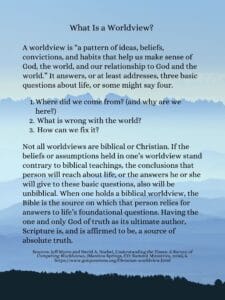 Not all worldviews are biblical or Christian. If the beliefs or assumptions held in one’s worldview stand contrary to biblical teachings, the conclusions that person will reach about life, or the answers he or she will give to these basic questions, also will be unbiblical. Thus, they will be false.
Not all worldviews are biblical or Christian. If the beliefs or assumptions held in one’s worldview stand contrary to biblical teachings, the conclusions that person will reach about life, or the answers he or she will give to these basic questions, also will be unbiblical. Thus, they will be false.
When one holds a biblical worldview, the Bible is the source on which that person relies for answers to the foundational questions. Having the one and only God of truth as its ultimate author, Scripture is, and is affirmed to be, a source of absolute truth. Thus, the a biblical worldview leads a person to accurate, correct answers to the core questions. A PDF file of this visual is available here. A typed copy is available here.
Why is it that 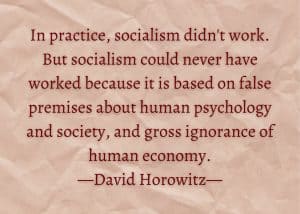 those who hold a biblical worldview favor capitalism over socialism? As we will see, it is because capitalism, not socialism, aligns with biblical teachings and ideals.
those who hold a biblical worldview favor capitalism over socialism? As we will see, it is because capitalism, not socialism, aligns with biblical teachings and ideals.
Note the quote at the top of this page from David Horowitz: “In practice, socialism didn’t work. But socialism could never have worked because it is based on false premises about human psychology and society, and gross ignorance of human economy.” (A PDF file of this visual is available here.) Even though Horowitz is not a Christian but a Jew who is an agnostic, his worldview leans in many ways toward a Christian or biblical worldview with regard to practical matters. A leftist radical in the 1960s, Horowitz changed his views in 1972 and is now an outspoken conservative. He is gravely concerned that Christians are being persecuted worldwide. (Go here and here for background information.)
Emphasize: We can see from his statement that Horowitz understands humanity is not “wired” for socialism to work. A communal approach to resources can’t work because “it is based on false premises about human psychology and society, and gross ignorance of human economy.”
Socialism Isn’t Commended in Scripture
Unfortunately, many Christians today have been led to believe that the Bible recommends, or at least allows for, socialism. They point to Acts 2:44-45 and 4:34-35 and contend that the early church practiced a form of socialism.
-
-
- Acts 2:44 Now all who believed were together, and had all things in common, 45 and sold their possessions and goods, and divided them among all, as anyone had need.
- Acts 4:34 Nor was there anyone among them who lacked; for all who were possessors of lands or houses sold them, and brought the proceeds of the things that were sold, 35 and laid them at the apostles’ feet; and they distributed to each as anyone had need.
-
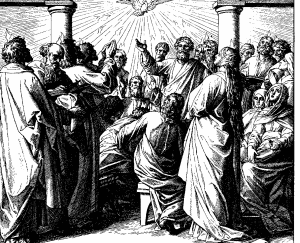
This wasn’t socialism for a good number of reasons, but the primary reason it wasn’t is that the actions of the members of the early church were voluntary, not forced or orchestrated by the government. (Additional background information is available here. Also, check out pages 3-10 of this publication, which deals not just with these two Bible passages in Acts, but with several others as well.)
Explain that during Session 2 the class will explore these passages from Acts, as well as the voluntary nature of church members’ participation.
What Economic System Does the Bible Recommend?
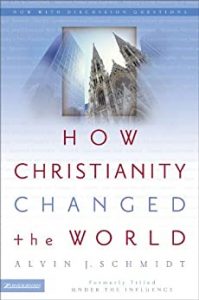 Ask: Well, then, if the Bible doesn’t recommend socialism, does it recommend capitalism, or an economic system relying on the free market? Explain: We can’t answer this question with a simple, unqualified yes or no, but an objective answer will tilt strongly in the affirmative direction. Perhaps Alvin Schmidt, a former sociology professor, says it best in his book How Christianity Changed the World.
Ask: Well, then, if the Bible doesn’t recommend socialism, does it recommend capitalism, or an economic system relying on the free market? Explain: We can’t answer this question with a simple, unqualified yes or no, but an objective answer will tilt strongly in the affirmative direction. Perhaps Alvin Schmidt, a former sociology professor, says it best in his book How Christianity Changed the World.
Even though Christianity does not espouse a given economic ideology, it would be quite erroneous to conclude that therefore [just] any economic ideology is compatible with Christian values and beliefs. Such a conclusion, however, is often made, especially by those who look favorably upon socialism.7
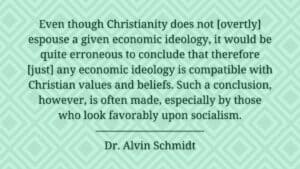
Explain: Schmidt makes a critical point from Scripture and then ties it to the arena of economics. Here is his observation, paraphrased:
Jesus extended to people the invitation to follow Him, but He never coerced them to do so.
Here are some examples.
-
-
- After healing ten lepers and then seeing only one return to thank Him, the Lord did not run after the other nine to get them to express their gratitude as well (see Luke 17:11-19).8
- Jesus lamented Jerusalem’s unwillingness to be gathered together in an intimate, close relationship with Him (see Matthew 23:37).9
- One more example, this one not cited by Schmidt, is that at a point in Jesus’ ministry at which the Master was losing followers, He did not run after those who were departing and beg them to return. Rather, He turned to His closest followers and asked, “Do you also want to go away?” (See John 6:60-69.)
-
This pattern of allowing individuals to make their own choices in the spiritual realm was established at the dawn of creation when God gave to Adam and Eve a choice to follow Him rather than “programming” them to do so (see Genesis 2:15-17 and Genesis 3:1-24).10 Indeed, Scripture is replete with examples highlighting the value of and encouraging wise choices. Just look at all of these! (Participants will be encouraged read and reflect on these as a part of an assignment before the next session.)
Schmidt goes on to make this important connection. He writes,
Just as God does not want people to be coerced in spiritual matters, so too he does not want them to be coerced in earthly matters, for instance, in their economic activities. There is not a single reference in either the Old or New Testament in which God denies economic freedom to people, as in fascism, socialism, and communism (emphasis added).11
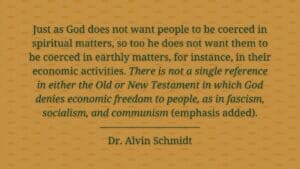
Ask participants to visit https://wordfoundations.com/choosewisely several times during the next few days and to complete the assignments given there, as they follow up on this session. Items include reading the Bible passages displayed, some of which you’ve discussed in this session. Participants also will be asked to reflect on
-
-
- the wisdom God shares with us in His Word to help us choose wisely,
- the negative consequences of choosing poorly, and
- the freedom God gives us to act or not act according to His will.
-
Participants also will be asked to think of how the Bible passages listed indicate that God is strongly encouraging, but not coercing, the reader or the person involved in the passage. A quote from Dr. Alvin Schmidt appears after the list of Bible passages, along with several questions for reflection and response.
Looking Ahead
Say: During our next session, we will begin to explore specific principles that show the free enterprise economic model aligns with Scripture.
Close by sharing this quote from Thomas Jefferson. You’ll hear it again in a future session.
A wise and frugal government… shall restrain men from injuring one another, shall leave them otherwise free to regulate their own pursuits of industry and improvement, and shall not take from the mouth of labor the bread it has earned. This is the sum of good government, and this is necessary to close the circle of our felicities [our intense happiness and satisfaction].
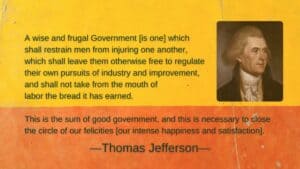
Some things to expect: During Session 2, you will introduce a list of ten principles that highlight overlap between biblical teachings and free enterprise. Here is the list (PDF file is here); the session will examine principles 1 and 2. Session 2 is based on material in part 2 of “The Bible and Free Enterprise.”
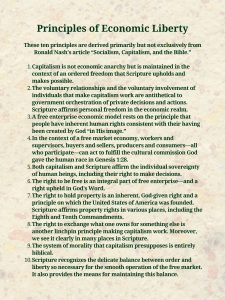
A PDF file of this graphic is available here. A PDF file of an overview of the Bible study series is available here.
Here are principles 1 and 2:
-
-
- Capitalism is not economic anarchy but is maintained in the context of an ordered freedom that Scripture upholds and makes possible.
- The voluntary relationships and the voluntary involvement of individuals that make capitalism work are antithetical to government orchestration of private decisions and actions. Scripture affirms personal freedom in the economic realm.
-
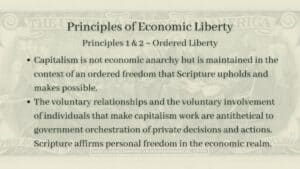
In preparation for the next session, enlist two participants who are willing to perform a dramatic reading during the session. These two extremely brief readings come from two preachers who have been considered to be among the finest in America. One participant will read a statement from a sermon by Dr. W. A. Criswell, and the other a statement from a sermon by Dr. D. James Kennedy. The readings are available here.
Conclude in prayer. Dear God, thank You that although you encourage us in the right way, You don’t coerce us. Thank you as well that free enterprise acknowledges human freedom. Help us to learn all we can about it in the weeks ahead, including how the Bible affirms it. In Jesus’ name. Amen.
-
-
- Session 2 is available here.
- List of Principles of Economic Liberty
- Principles of Economic Liberty Bible Study Home Page
-
Copyright © 2021 by B. Nathaniel Sullivan. All rights reserved.
Unless otherwise indicated, Scripture has been taken from the New King James Version®. Copyright © 1982 by Thomas Nelson, Inc. Used by permission. All rights reserved.
top image credit: Photo by Sharon McCutcheon on Unsplash
Notes:
1D. James Kennedy and Jerry Newcombe, What if Jesus Had Never Been Born? (Nashville: Nelson, 1994), 121.
2Jeff Myers and David A. Noebel, Understanding the Times: A Survey of Competing Worldviews, (Manitou Springs, CO: Summit Ministries, 2016), 100.
3Ibid.
4Ibid.
5Ibid.
6Myers and Noebel, 6.
7Alvin J. Schmidt, How Christianity Changed the World, (Grand Rapids: Zondervan, 2004), 204-205.
8,9,10Schmidt, 205.
11Ibid.
top image credit: Photo by Sharon McCutcheon on Unsplash
